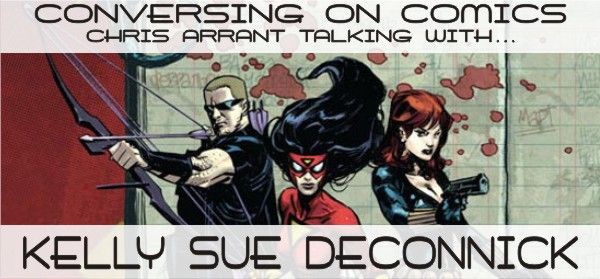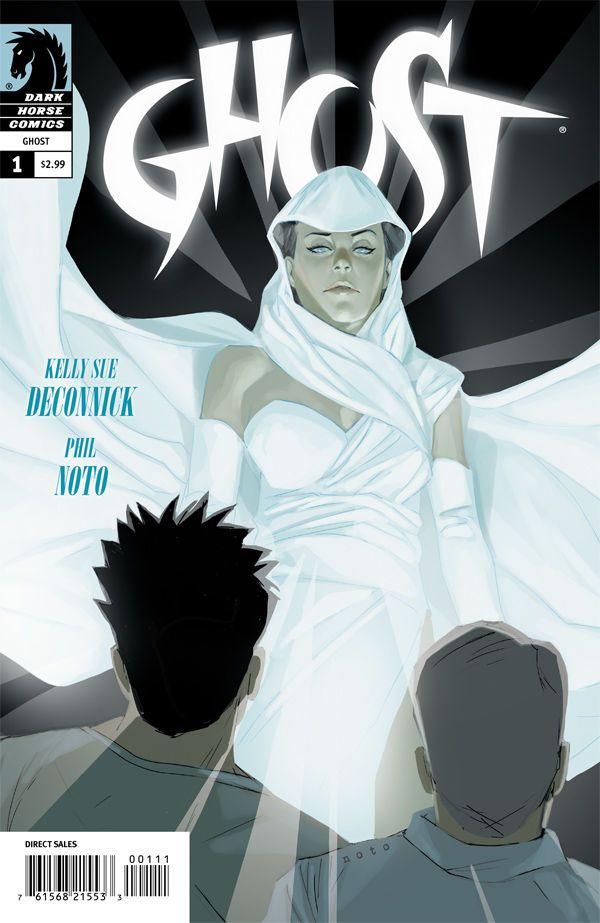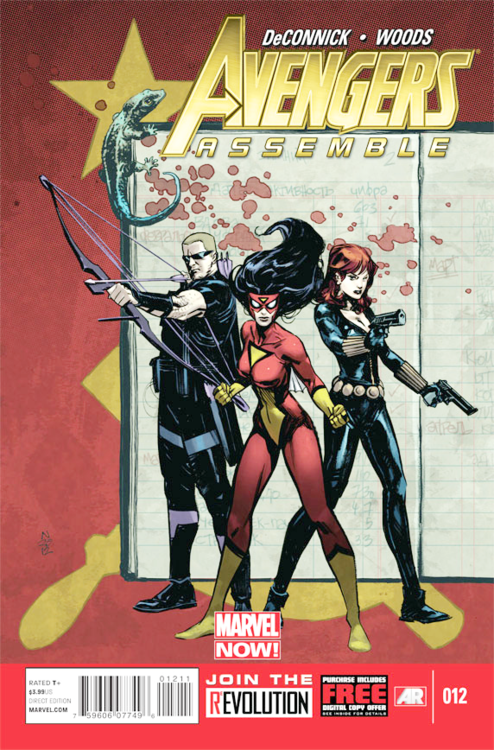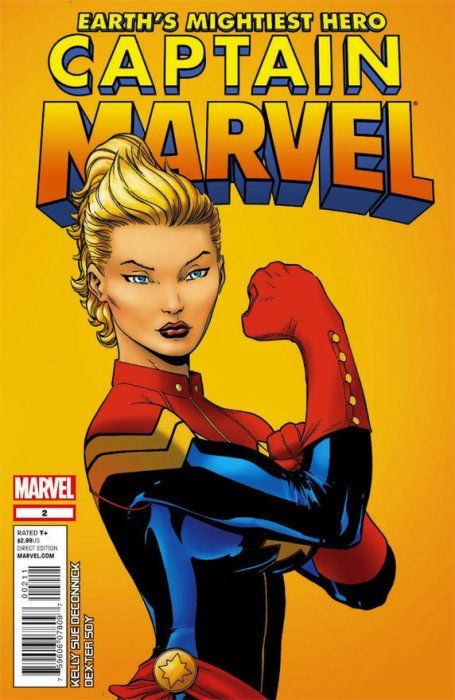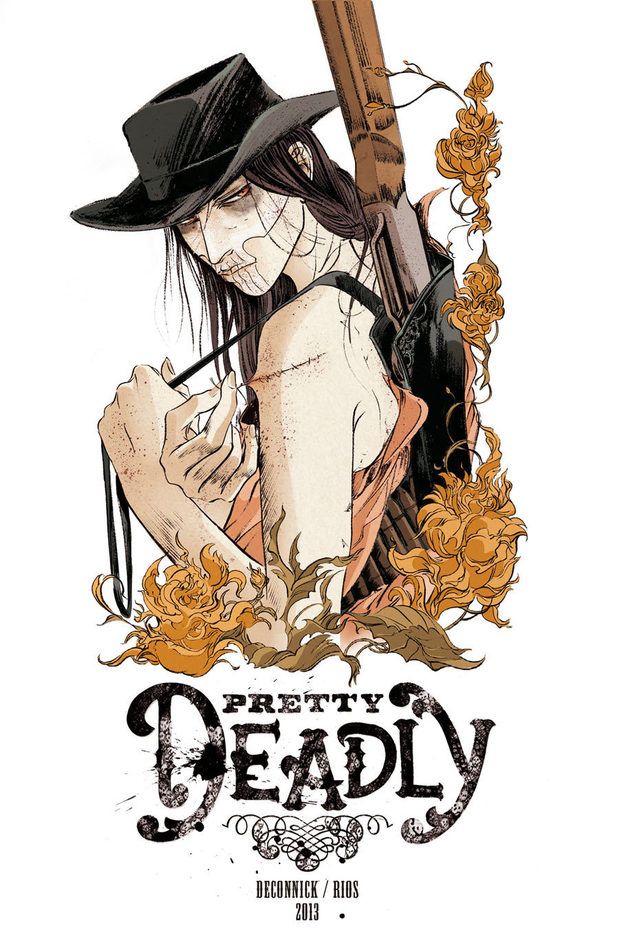It seems the next class of hot Marvel creators is rising faster than the publisher can slap on a moniker like "Young Guns," "Terrific Tens" or "Architects." Part of that group is Portland, Oregon-based writer Kelly Sue DeConnick. She recently launched the longtime Marvel heroine Carol Danvers, aka Ms. Marvel, in Captain Marvel, and she recently took over Avengers Assemble from Marvel's de facto chief writer Brian Michael Bendis. In addition, Dark Horse recently enlisted DeConnick to revive and revitalize its superhero pulp series Ghost, and she has her first creator-owned series in the works: Pretty Deadly, with her Osborn collaborator Emma Rios.
I've known about DeConnick peripherally for almost a decade now, reading her posts on the classic Warren Ellis Forum in the early '00s, years before she got into comics. She's shown herself to to have a remarkable wit in her comics and in interviews, and a real sense for action without losing heart in works like Captain Marvel and the short Black Widow story she created with Jamie McKelvie inside Enter The Heroic Age. Although 2012 seems like her biggest year yet, it feels as if she's on the precipice of something larger still. In my conversation with DeConnick, she was refreshingly upfront and revealing about riding the waves of life as a comics writer, and showed off a rarely seen side of what its like to be a comics creator.
Chris Arrant: Thank you again for doing this, Kelly. Let’s ease into this a bit: What are you working on today?
Kelly Sue DeConnick: Ghost. I love this book, but I'm stuck and in hell at the moment. Distract me.
Let's distract you by deconstructing your problem. For readers (and me) to understand what you go through sometimes, can you describe the particular roadblock you’re trying to work through in terms of Ghost right now – without spoiling the story, of course?
It's an exposition-heavy issue. I have to figure out how to get the information out that I need out and have the reader still feel like they're moving forward. One bit involves a flashback and another … really it's a series of flashbacks. I'm trying to figure out how to make this palatable.
2012 seems like a huge year for you – not only are you doing your first ongoing series, but you’re doing two – Captain Marvel and Avengers Assemble. Career-wise (and workload-wise), what’s that like for you to go from smaller finite projects to more open-ended things like this?
It feels like I'm in a constant state of fight or flight, honestly. I'm over-commited at the moment, and Pretty Deadly is ramping up. And there's another creator-owned thing I really want to do, and I've gotten a couple of offers on work-for-hire stuff -- it's the sort of thing that should have me ecstatic, I think, but I'm surprisingly bummed. I dunno. I don't want to sound ungrateful. I am incredibly lucky to have ANY job in this economy and this job in particular. I'm just tired. You may have caught me on a bad day.
The good news is the pressure is teaching me to work faster and less precious, for sure.
That's the workload part of the question. As far as the ongoing versus mini thing goes story-planning wise, I haven't had enough experience to properly answer that question, I don't think. We should maybe revisit that in a year. As it is, I'm just starting my third arc on Captain Marvel and I feel like it's just now clicking how you pick up threads from previous arcs and make them pay off at the same time you plant seeds for upcoming stories.
When a major new project comes to you, is there an initial buzz of glee in getting it, and if so, when does that wear off and the weight of the work come down on you?
The Fear sets in almost immediately -- before I get it, even. I trick myself into pitching by saying that there's no way I'm going to get it. That keeps me from being too paralyzed. Then, you know, I find something in the writing that tickles me and there's a thrill in that. Something works, and my confidence builds. And that makes it easier for me to work, so I start humming along. And then I discover a loophole I hadn't though of or whatever and it all crashes down again. Lather, rinse, repeat.
Good times.
I'm getting better at managing it, though. I'm remarkably good at not taking my work wins and losses as reflections on my person -- if that makes sense. I certainly get blue, angry, frustrated, insecure -- whatever, but I don't think I let myself feel like it's a personal failure. I'm not sure I'm articulating the distinction properly. I try to cherish that idea of Beginner's Mind and remember that this is all a process and only the long view matters.
As far as the weight of the work thing goes, I think I've learned not to expect anything to come easily. It's work. It's hard work. And I am a slow writer. My husband says I'm a novelist trapped in a comic book writer's body -- the way I work is really not suited to serial fiction. Not monthly serial fiction anyway.
Or perhaps, not this workload. I dunno. I'm going to either learn to work differently, work faster, or, I dunno… switch to prose? It's a big scary question for me, but it's looming.
You say “work faster and less precious.” Can you describe that latter part for you especially, and maybe provide an example of how you learned to do that – and the need to do that?
I tend to want to get everything "right" as I go. I have to rewrite individual scenes often multiple times before I can move forward -- consequently, my completed "first draft" actually consists of very few pages that haven't been redrafted. But I'm finding I just don't have time for that. If it's at all possible, I need to just leave it "good enough" keep moving forward and go back and fix later.
I hate it.
I'm also not great at writing to an outline. I have to intuit as I go, and that's just treacherous for serial fiction.
I think I understand Mark Waid works similarly? I don't really know him but I'd love to talk to him about it at some point.
I'd love to be a fly on the wall for that conversation.
Kieron Gillen once described writing his first ongoing as “telescoping” it out so you’re immediately planning a epic 80-issue arc but kind of compartmentalizing it out. What sources or things do you go to to try to learn to write ongoings that work for the readers, and more importantly, work for you as a writer trying to rein it in?
I don't know that I'm far enough into Captain Marvel or Avengers Assemble to say, honestly. I'm trying to plant seeds for myself -- things I want to come back to later, threads to connect, but I have no idea if I'm going to be successful or not.
The first two story lines for Captain Marvel are remarkably self-contained. The third goes back to some threads from the first, but whether or not it does that successfully it's too early to know.
In an interview with Multiversity Comics, you were open about how initially the Carol Danvers character in Captain Marvel didn’t mean much to you – not until you read old Ms. Marvel stories and connected with her based on your time living on Air Force bases as a child. As a writer, how important is it for you to find that personal connection for a character – and it is integral for any series you like to find something relatable?
I guess so? I've certainly turned books down before because I just couldn't get excited about them. I mean, I don't need to feel a kinship, I just need to feel passionate about some aspect of the story. I didn't feel a kinship with anyone in Osborn in particular. Nor Ghost, really. But I felt passionate about the politics behind Osborn and about some of the redemption ideas in Ghost.
Is there a feeling out process for you when you’re in line to pitch something, or thinking about pitching something, where you try to determine if its something you’d be excited to write?
I usually know right off if it's something that I'd be interested in, but I try to have an open mind. I got asked to consider a book for sometime next year that, off hand, I really was not interested in. I was asked to do some reading and think it over. The publisher sent me a bunch of material. So, I dunno. Maybe I'm wrong. I'm gonna have a look.
In two of these series you’re launching a new title, and in a way revamping them – but quite differently from Captain Marvel to Ghost. As a writer, what are the unique challenges when someone approaches you to fix/adjust/rework their character and make it, hopefully, more popular thing?
I can't know what's going to be popular, and I think trying to take that approach is really dangerous. All I can do is look at project and think, "What's at the thing about this I really love -- what's at the heart of that?"
And I don't think of myself as fixing anything. Maybe updating; there was definitely some updating with Ghost: '90s Ghost was very sexy, but the corset and REO Speedwagon neckerchief were suuuuuuper-dated. But other than that, it's just -- hey, here's my take.
And how do you do it as a writer without being too much a business analyst trying to mark of checkboxes of doing a revamp right?
Yeah, you can't think of it like that at all.
Or, I can't. That's paralyzing. And I think it kills the art. Does that sound pretentious? I hope not. I've been privy to conversations where people tried to build a book backwards based on what they thought would sell and it kind of grossed me out, frankly. I don't want to write like that.
You just have to make the book you would want to read and hope other people agree.
You made your initial mark in comics by translating and localizing manga for Viz and Tokyopop. How did that experience affect your writing style when doing your own projects, like you’re doing now?
I'm really dialogue-focused. That's probably the biggest thing …? That's the one I can point to, anyway. There might be other things, but I'm terrible at seeing patterns in my own work.
I talked about this with the guys at Comics! The Blog: I can characterize the books of my peers; I can recognize their "styles" and describe their work to someone who might be comic-shopping, say. But I can't describe my own work. I think we're all pretty blind when it comes to looking at ourselves. It feels like trying to pin down mercury. Every time I put my finger down, the stuff moves.
People may not know this, but you’re a diploma-carrying college grad with a degree in drama from UT Austin. There’s a big gap between your graduation and your induction into comics. Can you fill in the gaps and tell us what you were doing, especially writing wise, during that time?
What didn't I do?! I did post-operative wound care. I was a clown for store openings. I was a dresser backstage during Fashion Week. I did special-effects makeup. I wrote for dirty magazines. I did research for novelists. I helped attorneys write. I did temp placement for accountants. I answered phones at an orthopedic implant manufacturer. I worked at a boxing gym. There's probably more. Those are the first that leap to mind.
Did you learn anything at any of those post-college pre-comics jobs that you found surprisingly helpful in writing comics, or working in comics generally?
Yeah, I think working as an actor was directly relevant to my approach. I'm not sure about clowning or wound care. I used to say that writing for dirty magazines taught me to work to deadline, but to see me struggling now, I'm not sure that's true anymore.
One of the reasons I wanted to talk to you for this is to ask about Pretty Deadly, a new creator-owned series you’re doing with Emma Rios for Image in 2013. We all saw the promo image, but not much else has come out about it yet. Is it too soon to ask what it’s about?
A little …? I can tell you what it's about thematically, and I can tell you about some of the characters, but I haven't got my elevator pitch down about the plot just yet. Every time I start, I end up rambling like a crazy person.
So, thematically … what’s the story you’re aiming for with Pretty Deadly?
It's about dual natures, I guess.
People remember your first collaboration with Emma Rios on Marvel’s Osborn. Traditionally it seems at the Big Two writers and artists don’t always talk directly with each other. How did you and Emma get together, and at what point did you think, "Hey, I want to do more comics – more creator-owned comics – with Emma”?
Emma and I talked constantly during Osborn. And I was really, really nervous about asking her to do something creator-owned -- it felt like asking her to the prom. But she's SOOOOOO talented and she really pushes and inspires me. Everything you do with her is such an amazing collaboration. I just adore her. Seriously. Like, I would get matching tattoos with Emma.
I would probably have to get a matching tattoo with Laurenn McCubbin first to avoid getting cut, but fuck it. I'd get matching tattoos with them both.

